- Home
- Julie Hyzy
Deadly Interest Page 4
Deadly Interest Read online
Page 4
Aunt Lena shifted her weight from one foot to the other. She wasn’t a heavy woman, but standing out on the wet cement wearing only house slippers had to be uncomfortable for someone in her late sixties. “That’s who found her. They’re talking to her now, inside one of the squad cars. She called 911, and then she called us.”
“When did it happen?”
My aunt shook her head and shrugged, glancing at me briefly. “Moose picked up the phone around nine. I could hear the poor girl screaming, and I was all the way in the bedroom getting changed for bed. I came out to see what was wrong, but Moose couldn’t get her to settle down. We came over here right away. I thought she might’ve made some mistake and maybe Evelyn had just fallen, or something.”
I nodded. “I talked to her,” I said, almost to myself. “Around six-thirty.”
My aunt made a sympathetic noise. “You never know, do you? You just never know.” A half-second later, I heard her sharp intake of breath. One of the squads had moved forward, to allow passage of a black van with the telltale FH on its license plates. Funeral Home. A suited man threw open the van’s back doors, and pulled out a wheeled silver cart that expanded to body-transporting-size in seconds. “Oh my God,” my aunt said, her voice cracking. “Oh my God.”
“I’ll be right back,” I said, starting toward the police perimeter.
“Where are you going?” she asked reaching her hand out as if to hold me back.
I turned, shrugged. “I might have been the last person to see her alive,” I said, thinking: except for the murderer, that is. “I think I ought to let somebody know that.”
Another young officer, this one male, stopped me as I scooted between the bumpers of two squads. His nametag read: Randall.
“Hey, there,” he said. “Hold on a minute.”
“Who’s running this investigation?” I asked.
His dark eyes took in my formal dress, spiked shoes and far-too flimsy shawl. “And you are. . . ?”
Switching into professional mode gave me more comfort than I had any right to expect. “Alex St. James,” I said, leaving off the added information that I worked for Midwest Focus Newsmagazine. That’d get me bounced in a hurry. “I was here . . . with Mrs. Vicks earlier this evening. I thought I could be of some help?”
I ended the statement with a question. Officer Randall nodded once, told me to wait there, and disappeared into a crowd of uniformed officers standing near the funeral home’s van. Neighbors I’d known since I was a kid all stared at me with what seemed a combination of respect for approaching the authorities, and confusion as to why. I offered them a somber smile and turned to wait for Officer Randall’s return.
A moment later, he did, stopping at Mrs. Vicks’ tiny front yard and gesturing me closer. Her home had been roped off with bright yellow crime scene tape that caught the light in snatches as the wind tilted it back and forth. As I walked past her house, I looked down at the foot-high white plastic chain she always kept strung around her lawn to prevent kids from trampling, I felt yet another pang. Mrs. Vicks was part of my life, and I’d blown her off this evening when she needed to talk to me.
“This way,” he said, leading me toward a squad. “Detective Lulinski wants to see you.”
* * * * *
I’d never been in the back seat of a police car before, and while the warmth from its idling engine was a welcome change from the wet chill of the night, I couldn’t help but feel uncomfortable. I’d landed in a cloud of aroma, not at all good. It was such a combination of odors, ones I could imagine and others I’d prefer not to, that I blinked, hoping I could get used to it fast.
The entire seat was one piece of gray molded plastic. My backside slid as I got in, and I wound up accidentally pinning the long edge of my shawl under my butt. Officer Randall waited patiently for me to get myself settled, but I must have looked like the most uncoordinated passenger he’d ever had. Digging my heels into the floor, I lifted myself enough to loosen the shawl.
“You okay?”
“Yeah,” I answered, realizing I would have been happier waiting for the detective in the drizzle.
Randall looked as though about to close the door, but my left foot still hadn’t cleared. All this took mere seconds, but in that time, I watched Mrs. Vicks’s roommate, Diana, being helped from the back seat of the squad across from us.
Both her hands gripped the car’s doorframe in an effort to pull herself out. A man I assumed was Detective Lulinski alighted moments before. He held out his hand, offering assistance, but with her face positioned downward, Diana didn’t see it. Her stringy dark hair fell forward, and I could imagine the look of concentration she wore as she struggled to make her way outside. I couldn’t see her face, but her large build and lumbering manner made her identity clear.
I put Detective Lulinski in his late forties or early fifties. He was tall, with a thin build; his gray suit pants hung so loosely that I was glad he wore a belt cinching them at the waist. He had on white long-sleeve dress shirt, the collar opened, tie loosened. His hair was crew-cut short, and he scratched at gray eyebrows while he waited for Diana to step out.
“Thank you, Ms. Grady,” he said, finally able to grip her hand and help her as she stumbled.
She righted herself and stood, blinking in the blue flashes. Her lips moved, working as if to say something. She opened her mouth, closed it, then opened it again, her eyes wide with childlike terror. “I . . . don’t have nowhere to go.”
Diana had pulled her thick arms around her waist, in an effort to close a too-small sweater around her large frame. She lifted one hand to smooth damp hair behind her ear, and her drooping lips trembled.
The detective held her elbow, scanning the crowd. “Who were those people who came to help earlier? Maybe you can stay at their house tonight.”
Like a little child who realized she has the right answer for a trick question, she straightened, her eyes suddenly alert. “Lena Szatjemski,” she said.
I wiggled back out of the car’s smooth seat. “That’s my aunt,” I offered, moving toward them. “She’s over there, Diana.” I made an exaggerated “come here” gesture with my arm and Aunt Lena swooped in to take Diana safely away.
“We’ll need to talk to you again, later,” the detective said to her departing figure. I doubted she or my aunt heard him.
He turned to me and gestured toward the car that Diana had just vacated. “I’ll be just a minute. Have a seat.”
I did. The backseat of this squad was identical to the other, and the smell pretty close, too, though a bit less intense.
The detective conferred briefly with Officer Randall and then returned to me.
In the short amount of time he was outside the car, he pulled a cigarette from a pack in his shirt pocket, lit it and smoked it down to the filter, faster than I’d ever seen anyone do that before. The entire time, he maintained conversation with the uniformed officer, mouthfuls of expelled smoke accompanying his crisp directives.
He lowered himself into the back seat next to me. Up close, I could smell the freshness of the cigarette he’d just finished.
I slid over, making room, taking in this entire backseat experience. A clear Plexiglas panel separated us from the front seat, and a small handle at its center could be used to push it closed. Open now, I heard flat voices repeating information on the radio, but I couldn’t make out all the words.
“You were in the house today?” Detective Lulinski asked me, jerking his head and eyes toward Mrs. Vick’s home.
I nodded.
“What time?”
“I left about six twenty-five.”
He’d flipped open a notebook—the kind with the silver wire spiral at the top. From the looks of its bent shape, and the leftover shreds of paper where he’d pulled sheets out, he’d had this one for a while. “And the victim was alive to the best of your knowledge?”
My words caught in my throat. I wanted him to call her Mrs. Vicks. Not “the victim.”
Outside I
watched raincoated young men lead a black-zippered bag on the silver cart toward the open back doors of the dark van. Next they’d be calling her “the body.” At what point does death change a vibrant living person into “remains?” I shuddered, and blinked. “I’m sorry,” I said. “This had been too much of a shock. Can you repeat your question?”
He did. He asked me several questions about my relationship to Mrs. Vicks and then he asked me about Diana’s. I focused my attention on him. Despite being a thin man, he had paunch in his face. His jowls drooped ever so slightly, bringing his mouth into a downward scowl. Close up I could tell this was more a force of nature than of personality. His eyes were alert and he asked me again about Mrs. Vicks being alive when I was there.
“Yes, very much so,” I said, willing my voice to steady itself. “She was grateful to me because she’d locked herself out and I helped her back in.”
His hand stopped moving and he glanced up at me. “Neighbors have been telling me all night that she never locked her doors.”
I nodded, a presage to my answer. “That’s true. She never did. But Diana . . .” it was my turn to gesture into the dark outside, “she always would lock the doors, even when Mrs. Vicks asked her not to. And sometimes she did it when Mrs. Vicks would forget her key . . .” I let the sentence hang.
“And that’s what happened today?”
I nodded, again.
“How did you get in?”
I told him. He’d stopped writing and was watching me as I spoke, his eyes expressionless. Somehow that encouraged me to tell him more. I did. I told him about how grateful she’d been, and how I’d smelled the food and how she’d promised to make me dinner tomorrow night.
Out of habit I glanced at my watch. “It’s tomorrow, now,” I added.
“Where did you go afterward?”
I opened my mouth, reluctant to let on that I was part of the media. “A big dinner,” I said finally. “From work.”
His eyes took on a skeptical look as though he knew I’d held back. Again I felt a gaze taking in my outfit, heels and shawl.
“How was she killed?” I asked. “What were the circumstances?”
Back to scribbling, Detective Lulinski didn’t look up. He held up a finger, indicating I should wait. A few seconds later he asked me for my address, date of birth, and home, work and cell phone numbers, jotting them all down as fast as I spoke. Then, remembering my question, he finally answered, “We’re not releasing any details yet.”
“Did someone actually break in, or did she let them in?”
His expression impassive, his eyes blank, he repeated, “No details.”
Exasperated, I sat back, and let out a long sigh.
He had another question for me. “You said you picked up some papers in her house. Papers that fell?”
“Bank statements,” I said. “Yeah.”
“We’re going to need to fingerprint you. For elimination purposes.” He gazed at me with that flat expression, pulled out a business card and handed it over. “Come down to the station tomorrow.”
I nodded. I was being dismissed.
He got out of the car and looked at his watch. “Or, like you said—today.”
Chapter Five
I took the stairs, as usual, up to the second floor of our building. Constructed during the prohibition-era, the thirty-five-story edifice was home to our Midwest Focus staff. I loved the place. I loved walking up the marble stairs with their center carpet of deep red print, the kind I’d expect to find in a British nobleman’s castle. The effect wasn’t dispelled by the rest of the lobby. Gold-leaf paint trimmed the crown moulding above, and the gold elevator doors gleamed.
I cleared the top step, gazing ahead through the doors of our office. I could see everyone moving around, silent through the heavy glass. Like a bunch of office-mimes. Busy already.
A long night of rehashing poor Mrs. Vicks’ demise left me sleepless, and now I’d have to run the gauntlet of well-meaning colleagues.
“Alex!”
It started immediately as I pushed through the doors. The center of our spacious office was taken up by the “hub” where the entire support staff answered phones, prepared reports, and pretty much kept our craziness on an even keel.
I pasted on a smile, trying to answer all their exclamations with appropriate responses.
“I’m so sorry, Alex. You should have won that award.”
“It’s a shame, isn’t it? You okay? How did Bass handle it?”
“Oh, Alex, I heard about what that low-life Dan said in his speech. What an idiot. Just wait till it’s your turn.”
I tried nodding, agreeing, thanking, but all I wanted to do was bolt into my office. My assistant, Jordan, would help me sort through my morning jumble. A beautiful black girl just a few years younger than I, Jordan was one of my best friends. She waved to get my attention and I could tell from the look in her eyes that it had to be important.
“What’s up?”
She wheeled back a foot or two and swiveled in her chair to hand me one of those pink “while you were out” notes, her feminine handwriting spelling out a detailed message. “Your sister’s home called. A Lester Raymond,” she said, summarizing. “He tried to get ahold of your folks, but couldn’t reach them.”
Lucy’s institution, The Riverside School, was more of a halfway house than an actual educational establishment. The place had an incredible reputation. Despite our initial misgivings about leaving her in the care of others—with the benefit of hindsight, we knew placing her there had been exactly the right decision. She’d flowered and matured in the past year—more than we could have expected.
Downstate, the residence sat about halfway between Chicago and my parents’ home in Arkansas. They made it a point to visit her monthly, as did I, but the school only called when Lucy needed something unexpectedly. “He say what he wanted?”
“No. And I asked,” she said with a little frown. “This new patient confidentiality thing.”
I glanced down at the name. “I’ll call him.”
“How come he couldn’t get ahold of your parents? Are they okay?”
Out of the corner of my eye I saw William making his way toward his office. “Yeah. Very okay. They left this week for a month-long trip to Europe with their pinochle club friends. Can you believe it? I hope I’m as energetic as they are when I get to be that age.”
With a twist in my stomach, I thought about Mrs. Vicks—my parents’ age, now dead—killed in her home in cold blood.
“Um,” Jordan said, interrupting my musings, “you read today’s paper yet?”
I had a copy I’d shoved into my briefcase before I left the house. I’d brought it with me to read the coverage of Mrs. Vicks murder—although I had my doubts that it would’ve made the morning edition. “About to,” I said.
“Um,” she said again.
Immediately, my guard was up. “What is it?”
Her left hand reached over to a stack of files, and she turned to pull a cut-from-the-paper article out from beneath them. Swiveling back to face me, her expression was apologetic. “Probably better you hear it here, first.” As I grabbed the paper from her, she whispered, “Nobody’s going to take this seriously, okay?”
Sandra Stanek, gossip columnist extraordinaire, stared up at me from her photograph at the top of her daily column. In today’s writings, devoted entirely to the Davis Award ceremony the night before, she described all the glitz and glamour of the event, with names of attendees in bold print. My eyes, however, were drawn to the single picture, dead center in the column. A publicity shot Bass insisted upon. Dan and I posed together, he holding the coveted award, me looking like it didn’t matter that he’d won it. At the time the photographer flashed the shot, I remember shooting a glance Dan’s direction, thinking that I’d like to take the award and shove it up his pompous ass.
My eyes caught the caption: Alex St. James gazes warmly at Davis Award recipient Dan Starck after his charming acceptance speech. Th
e eyes say it all, don’t you think, folks? Might there be romance blooming here, again?
My jaw dropped.
Jordan’s voice was soft. “I thought I better show it to you before anybody else does.”
Speechless, I looked up. While fury bubbled up from my chest, Jordan looked at me with sympathy.
“Goddamn it,” I said, finally, slamming the article onto her credenza. “Can’t I catch a goddamn break? Ever?”
“Sorry, Alex.”
I shook my head, taking a deep breath to calm myself. “Not your fault.”
* * * * *
Ten minutes later William appeared at my door. “Hi,” he said. “Got a minute?”
“Of course.” I jammed a file into the open drawer I’d been working in, then hit it shut with my hip.
William closed the door behind him. At the sound of the click, I turned, puzzled.
With a shrug, he smiled. “Nothing bad. Just too many prying ears out there.”
I tossed the files onto my desk, but rather than head behind it, I took the seat next to him. I sighed. “I’ve got so much to tell you.”
His face brightened. “Good.”
“No,” I said, waving my hands in front of me. “Not good.”
“What is it?”
I opened my mouth, about to start with the events of late last night, but I stopped myself. He had such a pleasant expression on his face that I didn’t want to wipe it away with terrible news.
“You know what? I’d really rather you go first,” I said.
He didn’t need me to prompt twice. “Okay.” He took a breath, and I noticed again the color of his eyes. Like the lake in the afternoon. “I know that watching Dan Starck win that award at the Davis dinner was tough for you last night. It had to be. But,” he touched the back of my hand for the briefest moment, surprising me with the gesture, “you handled the ordeal so well. Better than anyone else would have.”
I shook my head to brush away that notion, but he continued, “No, really. You came across with real class.”
That made me smile. “Well, it’s just like you said in the parking lot. We’ll get ’em next time, right?”

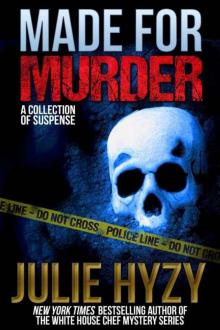 Made for Murder
Made for Murder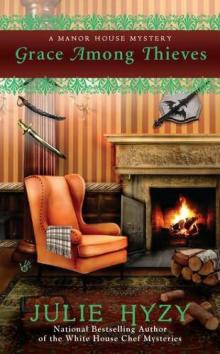 Grace Among Thieves
Grace Among Thieves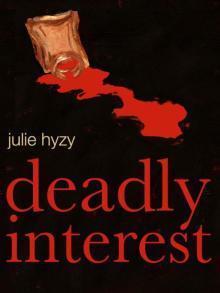 Deadly Interest
Deadly Interest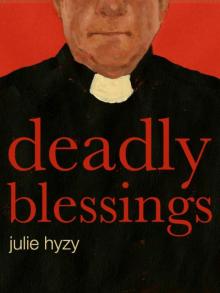 Deadly Blessings
Deadly Blessings All the President’s Menus
All the President’s Menus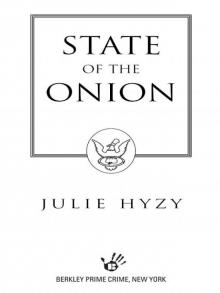 State of the Onion
State of the Onion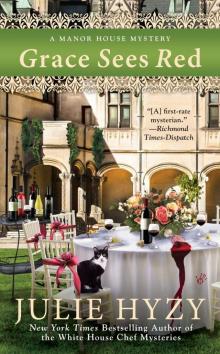 Grace Sees Red
Grace Sees Red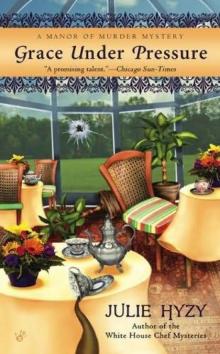 Whitehouse Chef 04 - Grace Under Pressure
Whitehouse Chef 04 - Grace Under Pressure Hail to the Chef
Hail to the Chef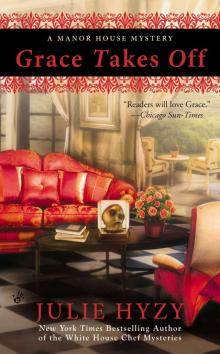 Grace Takes Off
Grace Takes Off Grace Against the Clock (A Manor House Mystery)
Grace Against the Clock (A Manor House Mystery) Grace Cries Uncle
Grace Cries Uncle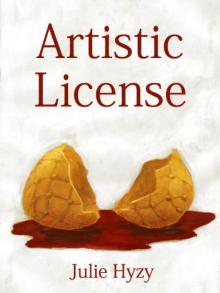 Artistic License
Artistic License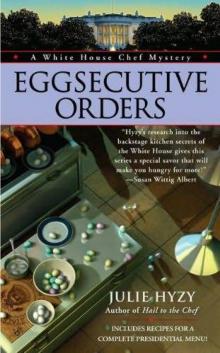 Eggsecutive Orders
Eggsecutive Orders Grace Interrupted
Grace Interrupted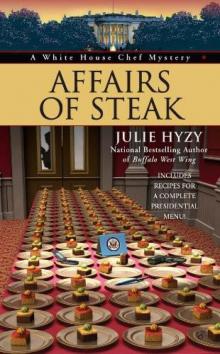 Affairs of Steak
Affairs of Steak Fonduing Fathers
Fonduing Fathers Foreign Éclairs
Foreign Éclairs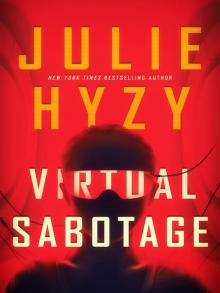 Virtual Sabotage
Virtual Sabotage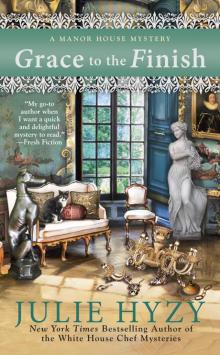 Grace to the Finish
Grace to the Finish